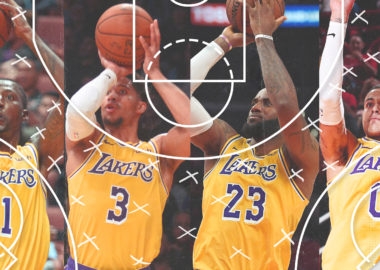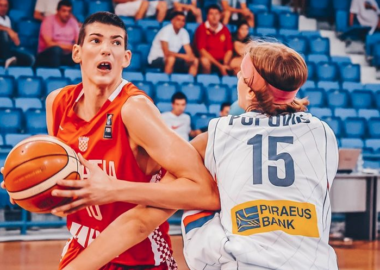
Quin Snyder’s Jazz: Slow Starts and Strong Finishes
Quin Snyder has been a fantastic hire for the Utah Jazz. After a few miserable years under Tyrone Corbin, Utah found their successor to the great Jerry Sloan. As runner up for Coach of the Year last year and improving even more this year, he’s done an amazing job not just winning basketball games but developing talent. In fact, our data has Coach Quin and his staff as the 11th best player-development group in the league.
But there’s an interesting trend I’ve noticed during his tenure in Utah. It seems his team starts off slow every year, but finished very strong. This has been true throughout each season as head basketball coach.
2014-2015
Quin’s first season as the lead man for the Jazz. He took over a team that won just 25 games the year before. There was some talent on the roster, but they were very young and inexperienced. Twenty-one games in and Utah found themselves losing 9 games straight. They were 5-16,s and the losing would continue for a few more months. At the All-Star break, the Jazz were 19-34 and 25th overall in the league.
And then something clicked. Well, Rudy Gobert took over. Addition by subtraction with the trade of Enes Kanter let Gobert take over the starting role.
A team that lost a bunch of games and hadn’t looked good for a majority of the season suddenly finished the season on a hot streak, winning 19 of their remaining 29 games. This was really the beginning of a strong defensive identity for Utah. After giving up over 98 points per game in the first 53 games, they held opponents to just 89 the rest of the way.
It took some time, but the very young core of Gordon Hayward (24), Alec Burks (23), Derrick Favors (23), Trey Burke (22), and Rudy Gobert (22) showed amazing growth over the season and the future looked bright. The slow start and strong finish was easily attributed to the progression and development of a young team.
2015-2016
With how they finished the previous season and a full offseason of development under their belt, the expectations were higher in 2015-2016. However, they got off to another slow start. After 42 games, they again found themselves 25th in the league at 18-24. The high hopes of the summer had not yielded the desired results.
That’s when things started to turn around for this young Jazz squad. A 7 game winning streak got things back on track, and they finished the season 40-42. After that poor start, they came within 1 bad loss against a depleted Mavericks team in the 2nd to last game of the season from making the playoffs.
Some of that poor start can certainly be due to Rudy Gobert missing 20 of the first 34 games, but not all of it. Quin had again figured out a way to improve in-season.
2016-2017
Gordon Hayward was a pending free agent and it was nearly time to go all in with this roster. A trade for George Hill significantly upgraded the point guard spot and internal development brought great results. Ultimately, the Jazz would win 50+ games for the first time in almost 10 years and advance to the 2nd round of the playoffs.
But everything was perfect out of the gate. The slow start didn’t last nearly as long this season, but the Jazz were still under .500 15 games into the season. Even late into December, they were only 7th in the West. But they played their best basketball down the home stretch and took out the Clippers in a game 7 on the road before getting ousted by the Golden State Warriors.
2017-2018
Gordon Hayward bailed and it looked like the Jazz might have to start over. Enter Donovan Mitchell. Utah’s expectations going into this season were interesting. With Rudy Gobert in the middle they were too talented to tank, but they weren’t supposed to make the playoffs either. New-addition Ricky Rubio took a long time to adjust and Mitchell had to learn the ropes of the NBA. This is one of NBA history’s best mid-season turnarounds.
On January 22 the Jazz lost to the lowly Hawks and were 19-28 on the season. At 10th in the West and 5 games out of playoff position, their odds at returning to the postseason were next to none. Unless you have winning streaks of 11, 9, and 6 games in just 2.5 months of basketball! Quin Snyder’s patience with Ricky Rubio and confidence in Donovan Mitchell and Rudy Gobert paid off big time to the tune of a 29-6 record to end the season. They stormed all the way up to 5th in the conference and defeated the OKC Thunder in 6 games.
The Jazz had significant changes over the summer and took time to adjust, but everything came together even better than ever before.
2018-2019
Fresh off another 2nd round playoff finish, the expectations were a little higher coming into this season. GM Dennis Lindsey opted to bring almost the exact same roster back, so the slow start was not expected to be an issue. However, the Jazz once again found themselves under .500 and out of the playoffs at the halfway point in the season.
Since falling to 20-21, the Jazz have gone 16-6 and climbed up to 6th in the West. Media members wrote many words about how difficult Utah’s schedule was to start the season. They had played more road games than anyone in the league, and a home game was often sandwiched between road trips. Does this account for all of the struggles, or is it just another example of the multi-year trend?
Just Coincidence or More?
Each year of Quin Snyder’s tenure there have been justifiable reasons as to why they started the year off slow. From injuries, young talent, new players, and difficult schedules. Yet, each year they hit their stride in the back half of the schedule to win more games than was expected. Are the slow starts primarily due to those relatively uncontrollable factors, or is it something more? Are players not coming back from the offseason as prepared as they could be? I doubt it. Does Quin Snyder make great mid-season adjustments? Certainly. Or is the initial game-plan to start the season not quite right? Possibly.
How the Jazz play game-to-game is like a microcosm of this overarching trend. Utah’s poorest scoring and shooting quarter over the season is the first quarter. They tend to start a little slow and improve as the game goes on.
Honestly, I don’t have a definitive answer as to why this happens game after game, year after year. But if history tells us anything, the Utah Jazz are about to win a lot of basketball games.


